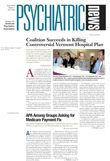When residents attend industry-supported educational programs, dinners, and other functions, they may not have a clear idea of what is expected of them.
To help residents better define their roles as physicians and to provide them with an ethical framework when interacting with the pharmaceutical industry, Michael Jibson, M.D., Ph.D., director of resident education and a clinical associate professor of psychiatry at the University of Michigan, has designed a course for second-year residents.
At the annual meeting of the American Association of Directors of Psychiatric Residency Training (AADPRT) in Long Beach, Calif., in March, he discussed the course with residency training directors.
In his course, “An Ethical Framework for Clinician/Industry Interactions,” Jibson said he educates residents about the different types of contacts that take place between physicians and industry and the positive and negative aspects of those contacts for residents. He stated that he also addresses ethical considerations physicians must weigh before participating in industry contacts.
Because some physicians may be unaware that there are standards to guide their side of industry contacts, Jibson said he teaches his residents about the 1991 AMA document titled “Gifts to Physicians from Industry,” published in the January 23/30, 1991, issue of the Journal of the American Medical Association.
The AMA’s Council on Ethical and Judicial Affairs designed the guidelines so that physicians can “avoid the acceptance of inappropriate gifts” from the pharmaceutical industry (see story on
page 22).
In the guidelines, physicians are discouraged from accepting any gifts but those of “minimal value” from the pharmaceutical industry, for instance, and to decline drug company offers to pay for travel, lodging, or other personal expenses incurred by physicians attending an industry-supported event.
Jibson said that when he introduces residents to these guidelines, many of his students admit that they have violated them. Jibson also admits his guilt, he told training directors at the session.
For instance, since he doesn’t want sticky pads with brand names in his office where patients can see them, Jibson said he takes the pads home to his children, who like to draw on them. Whenever he brings these pads home, he breaks the first AMA guideline, which specifies that physicians accept only those gifts that benefit patients.
By illustrating this minor infraction for residents, Jibson said, he emphasizes the importance of the ethical framework that must be considered when observing AMA’s guidelines. “We take one step back and look at the ethical considerations that led to these guidelines.”
Jibson teaches residents to distinguish between a contracted service between a physician and a drug company versus a marketing contact, for instance, and how those are different from educational programs. “One of the biggest dangers in our involvement with the pharmaceutical industry is confusing those interactions,” he said.
For instance, the intentions of a pharmaceutical representative during a marketing contact, where he or she schedules an appointment with a physician to talk about a certain drug, are clear. But when the pharmaceutical industry offers to pay a doctor to serve on a regional advisory board, the intentions are not made explicit, Jibson cautioned. In this situation, the industry acts as a contract service by paying the physician upward of $1,000 to sit on an advisory board and listen to a presentation on a certain drug.
The physician is then paid to provide feedback to the company about the quality of the presentation. In the end, Jibson said, physicians don’t provide much service to the pharmaceutical company because the feedback session is such a small part of the total interaction. Jibson said he tells residents that it is not clear who is advising whom at these meetings. “You listen to the industry people pitch their product, and in the end it is not much different from listening to a realtor who gives you a TV set after you listen to a presentation on some choice property.”
Other contacts with the industry are desirable for physicians, Jibson explained. Pharmaceutical companies provide unrestricted grants that underwrite research and “educational programs at community mental health centers that would not otherwise be able to provide high-quality programs. . . . This is a wonderful addition to medical education,” said Jibson.
But Jibson said he also alerts residents to be aware of the fact that some drug-sponsored educational programs may not be what they seem. For instance, drug companies pay physicians to attend a CME program at a sunny resort. Physicians learn about a certain medication in morning sessions and have afternoons free to golf, sail, and swim. “This looks more to me like a bribe than an educational program,” he observed.
Gifts of nominal value, such as pens, Jibson said, remind a doctor that a drug is available. However, he noted that many studies have shown that even minor gifts have an impact on clinical decisions. ▪
